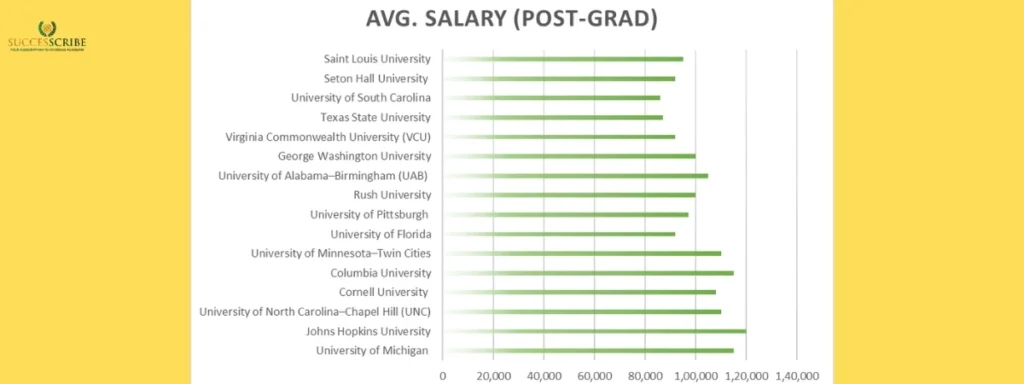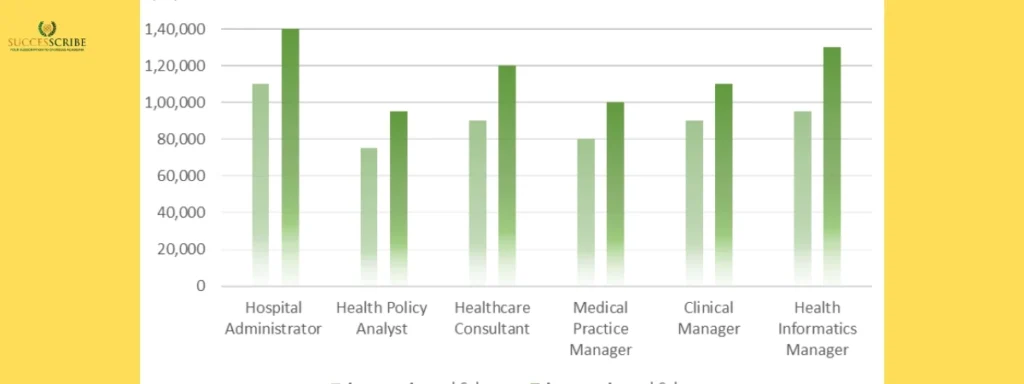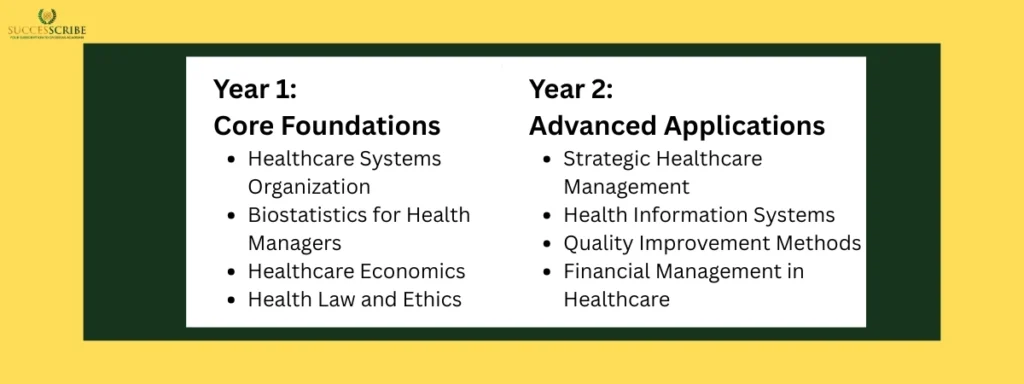The healthcare industry in the United States is one of the largest and most advanced in the world, contributing over $4.3 trillion annually, which is nearly 18% of the nation’s GDP (Centers for Medicare & Medicaid Services, 2023). With an aging population and increasing demand for healthcare services, the need for skilled healthcare administrators is rising. A Masters in Health Administration in USA equips students with the leadership, managerial, and analytical skills required to excel in this dynamic field.
This comprehensive topic covers everything you need to know about pursuing an MHA in the USA, including top universities, costs, scholarships, eligibility, career prospects, and salary expectations.
What is a Master’s in Health Administration (MHA)?

An MHA is a graduate-level degree designed for individuals seeking leadership roles in healthcare organizations. Unlike an MBA with a healthcare focus, an MHA is specialized in healthcare systems, policy, and administration, preparing graduates for careers in:
- Hospitals & health systems
- Consulting firms
- Insurance companies
- Government agencies (CDC, NIH, CMS)
- Non-profit healthcare organizations
Key Skills Gained in an MHA Program
- Healthcare finance & economics
- Health policy & law
- Strategic management
- Data analytics & informatics
- Quality improvement & patient safety
Also Read: Masters in health informatics in USA
Want to Study in Europe?
Start your journey with Successcribe’s free expert guidance
Book a Free Session NowWhy choose USA for Master’s in Health Administration
The United States is the #1 destination for healthcare management education, and here’s the prominent reasons why you should choose Masters in Health Administration in USA:
| $4.3 Trillion Industry | The US has the largest healthcare system in the world, investing 17.3% of GDP in healthcare. |
| 28% Job Growth | Health services management jobs are expected to grow 28% by 2031, creating over 136,000 new roles (U.S. BLS) |
| $90,000 – $130,000 Average Salary | MHA graduates earn high salaries, with senior roles crossing $150,000/year. |
| Top 20 Global Universities | The US hosts more than 20 top-ranked universities offering accredited MHA programs |
| 36-Month OPT for STEM | Students can work in the US for up to 3 years post-graduation if enrolled in STEM-related tracks like Health Informatics |
| Internships with Healthcare Giants | Opportunities at Mayo Clinic, Kaiser Permanente, and UnitedHealth Group. |
| Global Alumni Network | Study with peers from 100+ countries, boosting international exposure and opportunities |
Also Read: MBBS fees in USA for International students
Top 16 Universities for Masters in Health Administration in USA

The United States is home to some of the world’s leading universities offering specialized and accredited Master’s in Health Administration (MHA) programs. These institutions are recognized for their academic excellence, strong healthcare industry connections, experienced faculty, and impressive graduate employment rates.
Here’s a list of the top universities for MHA in the USA along with key details:
| University | Program Name | Avg. Salary (Post-Grad) |
| University of Michigan | Master of Health Services Administration (MHSA) | $115,000 |
| Johns Hopkins University | Master of Health Administration (MHA) | $120,000 |
| University of North Carolina–Chapel Hill (UNC) | Master of Healthcare Administration (MHA) | $110,000 |
| Cornell University | Master of Health Administration (MHA) | $108,000 |
| Columbia University | Master of Health Administration (MHA) | $115,000 |
| University of Minnesota–Twin Cities | Master of Healthcare Administration (MHA) | $110,000 |
| University of Florida | Master of Health Administration (MHA) | $92,000 |
| University of Pittsburgh | Master of Health Administration (MHA) | $97,000 |
| Rush University | Master of Science in Health Systems Management (MS-HSM) | $100,000 |
| University of Alabama–Birmingham (UAB) | Master of Science in Health Administration (MSHA) | $105,000 |
| George Washington University | Master of Health Administration (MHA) | $100,000 |
| Virginia Commonwealth University (VCU) | Master of Health Administration (MHA) | $92,000 |
| Texas State University | Master of Health Administration (MHA) | $87,000 |
| University of South Carolina | Master of Health Administration (MHA) | $86,000 |
| Seton Hall University | Master of Healthcare Administration (MHA) | $92,000 |
| Saint Louis University | Master of Health Administration (MHA) | $95,000 |
Also Read: Top medical colleges in USA
Apply to Top European Universities
Make your application simple and stress-free with Successcribe
Get Expert Help NowEligibility Criteria and Admission Requirements for Masters in Health Administration in USA
Here is the eligibility criteria and admission requirements for Masters in Health Administration in USA
Eligibility Criteria
- Academic Qualification: Bachelor’s degree in any discipline (health sciences, public health, management, or life sciences preferred)
- Minimum GPA: 3.0 on a 4.0 scale (equivalent to 65%-70% in Indian grading)
- GRE: Optional at most institutions
- English Proficiency:
| Test Name | Score |
| IELTS | 6.5 or higher |
| TOEFL | 90+ |
Admission Requirements
- Completed online application form
- Academic transcripts
- Statement of Purpose (SOP)
- 2–3 Letters of Recommendation
- Updated CV/Resume
- TOEFL/IELTS score report
- GRE score (if required)
- Proof of financial support
Career Prospects After MHA in the USA

MHA graduates enter mid-to-senior level management roles across hospitals, insurance firms, consulting companies, NGOs, and government agencies.
| Job Role | Average Annual Salary |
| Hospital Administrator | $110,000 – $140,000 |
| Health Policy Analyst | $75,000 – $95,000 |
| Healthcare Consultant | $90,000 – $120,000 |
| Medical Practice Manager | $80,000 – $100,000 |
| Clinical Manager | $90,000 – $110,000 |
| Health Informatics Manager | $95,000 – $130,000 |
Salary after MHA in the USA
| Experience Level | Average Salary (USD/year) |
| Entry-Level (0-2 yrs) | $65,000 – $85,000 |
| Mid-Level (3-6 yrs) | $90,000 – $120,000 |
| Senior-Level (7+ yrs) | $130,000 – $170,000 |
Work Visa After Masters in Health Administration in USA (OPT & H-1B)
- After graduation, international students can apply for OPT (Optional Practical Training), valid for 12 months.
- If your program qualifies under STEM (e.g., Health Informatics), OPT can be extended to 36 months.
- Many graduates then transition to H-1B work visas through employer sponsorship
Also Read: Bachelor of nursing in USA
Cost of Studying MHA in the US for Indian Students
Pursuing a Master’s in Health Administration (MHA) in the United States is a rewarding yet considerable financial decision for Indian students. Being aware of the various expenses involved from tuition to day-to-day living, can help plan better and reduce financial strain.
Below is a comprehensive breakdown of the costs involved in pursuing an MHA degree in the U.S.:
1. Tuition Fees
Tuition varies widely based on the type of institution, the state it’s located in, and whether it’s public or private.
| Public Universities | USD 30,000 – USD 45,000 per academic year |
| Private Universities | USD 50,000 – USD 65,000 per year |
2. Cost of Living
Living expenses depend greatly on the city and lifestyle. Major cities are typically more expensive than suburban or smaller towns.
| Expense Area | Monthly Estimate (USD) | Yearly Estimate (USD) |
| Housing (shared) | $600 – $1,000 | $7,200 – $12,000 |
| Meals & Groceries | $200 – $300 | $2,400 – $3,600 |
| Transport | $70 – $150 | $840 – $1,800 |
| Internet & Utilities | $100 – $150 | $1,200 – $1,800 |
| Personal Expenses | $100 – $200 | $1,200 – $2,400 |
| Total Estimate | $12,000 – $20,000 |
3. Health Insurance
Health coverage is mandatory for international students and is either included in tuition or separately payable.
- Annual Premium: USD 1,500 – USD 3,000
4. Academic Supplies & Books
Depending on the program and university, students may need to purchase or rent textbooks and additional academic tools.
- Estimated Annual Cost: USD 500 – USD 1,500
5. Travel and Visa Expenses
Initial travel and visa processes also contribute to your upfront costs.
| Type of Expense | Estimated Cost (USD) |
| Flight from India to USA | $700 – $1,200 |
| Student Visa (F-1) & SEVIS | $510 (total) |
| Local Travel (per semester) | $200 – $500 |
6. Exam & Application Costs (One-Time)
Before starting your program, you’ll have to cover test and application-related charges.
| Item | Cost in USD |
| GRE (if applicable) | $220 |
| IELTS/TOEFL | $190 – $210 |
| Application Fees (per uni) | $50 – $120 |
| Courier Charges | $50 – $100 |
Also Read: Best states in USA for international students
Scholarships and Financial Aid for MHA Students in the USA
Pursuing a Master’s in Health Administration (MHA) can be a significant financial commitment. However, many scholarships, grants, assistantships, and financial aid programs are available to support deserving students.
Popular Scholarships for MHA Students
| Scholarship Name | Details | Award Amount |
| ACHE Scholarship | Offered by the American College of Healthcare Executives (ACHE), this scholarship supports students demonstrating leadership potential in healthcare management. | $5,000 |
| CAHME Scholarships | The Commission on Accreditation of Healthcare Management Education (CAHME) offers multiple scholarships to students from CAHME-accredited programs. Awards are based on academic excellence, leadership, and commitment to healthcare. | Varies ($2,000–$10,000) |
| Foster G. McGaw Graduate Student Scholarship | Sponsored by the Association of University Programs in Health Administration (AUPHA), this prestigious scholarship rewards exceptional graduate students in healthcare management programs. | $5,000 |
| University-Specific Scholarships | Many universities offer institutional aid, merit-based scholarships, or need-based grants for MHA students. For example, the University of North Carolina at Chapel Hill and George Washington University offer scholarships that can cover up to 25% of tuition fees. | Up to 25% tuition waiver |
Assistantships for MHA Students
Graduate assistantships are another excellent way for MHA students to manage their education costs while gaining valuable professional experience.
| Type | Description | Benefits |
| Graduate Research Assistantship (GRA) | Students assist faculty with research projects, data analysis, literature reviews, and administrative tasks. | Covers 25%-100% tuition fees plus a monthly stipend (typically $1,000–$2,000 per month). |
| Graduate Teaching Assistantship (GTA) | Students support professors by grading assignments, assisting in labs, and leading discussion sections. | Tuition waiver and stipend, sometimes including health insurance. |
Course Highlights: What You Study in an MHA Program
The Masters in Health Administration in USA offers specialized courses in healthcare leadership, policy development, and financial management, which are integral to building a sustainable and efficient healthcare environment.
| Area of Study | Subjects Typically Included |
| Healthcare Systems | US Healthcare System, Global Health Perspectives |
| Healthcare Finance | Budgeting, Financial Management in Healthcare |
| Health Policy & Law | Healthcare Laws, Policy Analysis |
| Healthcare Operation | Facility Management, Quality Improvement |
| Strategic Management | Organizational Behavior, Leadership Strategies |
| Data Analytics in Healthcare | Health Informatics, Big Data Applications |
Also Read: Duolingo accepting universities in USA
Curriculum Breakdown for Masters in Health Administration

A typical MHA curriculum progresses through foundational to advanced topics:
Year 1: Core Foundations
- Healthcare Systems Organization
- Biostatistics for Health Managers
- Healthcare Economics
- Health Law and Ethics
Year 2: Advanced Applications
- Strategic Healthcare Management
- Health Information Systems
- Quality Improvement Methods
- Financial Management in Healthcare
Many programs offer concentration areas such as:
- Hospital Administration
- Health Policy
- Long-Term Care Administration
- Health Informatics
Specializations in MHA Programs in USA
Many MHA programs offer concentrations in specialized areas of healthcare administration:
1. Healthcare Informatics and Analytics
This specialization focuses on leveraging data for improved decision-making in healthcare settings. With healthcare data growing at a rate of 48% annually, professionals skilled in health informatics are in high demand.
2. Healthcare Financial Management
This concentration prepares students to navigate the complex financial aspects of healthcare organizations, including reimbursement systems, revenue cycle management, and capital budgeting.
3. Health Policy and Advocacy
Students focusing on this area develop expertise in healthcare policy analysis, development, and implementation at local, state, and federal levels.
4. Long-term Care Administration
With the US senior population expected to exceed 73 million by 2030, this specialization prepares students for leadership roles in nursing homes, assisted living facilities, and home healthcare organizations.
5. Population Health Management
This emerging concentration focuses on improving health outcomes for defined groups through coordinated care delivery, preventive interventions, and community engagement.
6. Healthcare Quality and Patient Safety
This specialization addresses the critical need to improve healthcare quality while reducing medical errors, which contribute to an estimated 250,000 deaths annually in the US.
7. Healthcare Entrepreneurship and Innovation
Students pursuing this track develop skills to identify market opportunities and implement innovative solutions within healthcare systems or launch healthcare startups.
Also Read: Dental hygienist course in USA
The Growing Demand for Healthcare Administrators

The healthcare administration field is experiencing remarkable growth, driven by several converging factors. According to the U.S. Bureau of Labor Statistics, employment of medical and health services managers is projected to grow 28% from 2021 to 2031, significantly faster than the average for all occupations. This translates to approximately 56,600 job openings annually over the decade.
Several key factors are driving this extraordinary demand:
- Aging U.S. Population: By 2030, all baby boomers will be at least 65 years old, comprising about 21% of the population. This demographic shift is dramatically increasing healthcare service utilization.
- Regulatory Complexity: The ongoing implementation of healthcare reform initiatives has created intricate compliance requirements that necessitate specialized administrative expertise.
- Technological Integration: The widespread adoption of electronic health records (EHRs) and other healthcare technologies requires administrators who can navigate both clinical and technological realms.
- Value-Based Care Models: The transition from fee-for-service to value-based care models demands sophisticated management approaches to balance quality outcomes with financial sustainability.
This robust job market has corresponding financial rewards. According to the American College of Healthcare Executives (ACHE), the median annual salary for healthcare executives with master’s degrees was approximately $127,980 in 2023, with those in executive leadership positions often earning significantly more. At top-tier organizations, chief executive officers and other senior executives frequently command compensation packages exceeding $300,000 annually.
Also Read: Best place to study in USA
MHA vs. MBA in Healthcare

When planning a career in healthcare leadership, two prominent degree options often considered are the Master of Health Administration (MHA) and the MBA in Healthcare Management. While both pathways lead to leadership roles, they differ in curriculum focus, career outcomes, and skills imparted.
| Aspect | Masters in Health Administration | MBA in Healthcare Management |
| Primary Focus | Specialized in healthcare systems, policies, hospital administration, and healthcare leadership. | Broader business education with specialization in healthcare industries. |
| Curriculum | Healthcare law, epidemiology, health economics, health policy, hospital finance, patient safety, ethics. | Core business disciplines (finance, marketing, operations) with healthcare electives. |
| Program Duration | Typically 2 years | Typically 2 years |
| Ideal Candidates | Individuals seeking leadership roles specifically in hospitals, public health organizations, and healthcare consultancies. | Candidates interested in diverse business roles, including healthcare corporate strategy, entrepreneurship, and consulting. |
| Common Job Titles | Hospital Administrator, Health Services Manager, Clinical Director, Practice Manager | Healthcare Consultant, Healthcare Business Analyst, Corporate Healthcare Strategist |
| Average Salary | $100,980/year | $102,450/year |
| Notable Universities | University of Michigan, Johns Hopkins University, University of North Carolina–Chapel Hill | University of Pennsylvania (Wharton), Harvard University, Duke University (Fuqua) |
Conclusion
A Masters in Health Administration in USA is a high-return investment. It offers strong job growth, six-figure salaries, and leadership opportunities in a dynamic industry. With top-ranked programs, extensive career pathways, and evolving industry trends, an MHA is ideal for those passionate about transforming healthcare delivery.
Prospective students should research accredited programs, evaluate costs, and align their career goals with the right specialization. The future of healthcare administration is bright, and an MHA can be the key to unlocking its potential.
FAQs
What is the difference between an MHA and an MBA in Healthcare?
An MHA focuses exclusively on healthcare management, policy, and systems, while an MBA in Healthcare combines general business administration skills with healthcare electives. If you aim for leadership roles specifically in healthcare organizations, an MHA is often preferred.
Is GRE required for admission to MHA programs in the USA?
Many top universities have made the GRE optional for MHA admissions. However, some programs may still recommend or require it, so it’s best to check specific university requirements.
Can international students work while studying Masters in Health Administration in USA?
Yes, international students on F-1 visas can work up to 20 hours per week on-campus during semesters and full-time during breaks. After graduation, they are eligible for OPT (Optional Practical Training).
What interdisciplinary skills are most critical for success in health administration leadership roles?
Beyond healthcare knowledge, critical skills include strategic thinking, financial acumen, data-driven decision-making, ethics, intercultural communication, and change management.
Is work experience required to apply for an MHA program?
While not mandatory, some universities prefer applicants with 1–2 years of professional experience in healthcare, administration, or management roles.
Related Post
MBA in business analytics in USA
MBA in USA without GMAT
MBA in USA without work experience
Masters in robotics in USA















